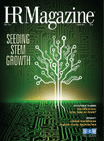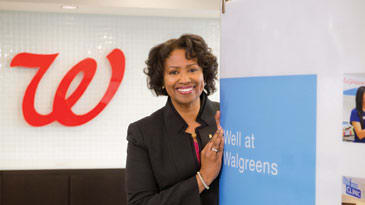 Kathleen Wilson-Thompson didn’t start her career in human resources. A former employment lawyer, she was well-versed in global HR by the time she joined Walgreen Co. as senior vice president and chief human resources officer four years ago. It’s been a time of immense change for the company and the pharmacy industry.
Kathleen Wilson-Thompson didn’t start her career in human resources. A former employment lawyer, she was well-versed in global HR by the time she joined Walgreen Co. as senior vice president and chief human resources officer four years ago. It’s been a time of immense change for the company and the pharmacy industry.
With a workforce of more than 250,000, Walgreens has expanded its reach by investing in and partnering with the European company Alliance Boots and drug distributor AmerisourceBergen, making the chain the world’s largest drug buyer.
Kathleen Wilson-Thompson |
Wilson-Thompson is responsible for all HR-related strategy at Walgreens. During her tenure, the increasingly multinational company has rolled out a leadership academy, a program to integrate Walgreens culture throughout its rapidly expanding business, and a corporate university to encourage and serve employee learning.
She shares her insights on delivering HR services and driving business strategy—as well as the lessons she learned from her mom.
Why did Walgreens start a corporate university last year, and what impact has it had?
We wanted to create an innovative and agile talent pool, one that’s diverse and fosters a powerful cross section of thoughts and ideas. From our leaders in our community centers to our store managers, learning and growing every day is essential to delivering our business strategy.
Walgreens University offers more than 200 courses through classrooms, e-learning and self-paced activities to employees at all levels and career stages. We worked with learning institutions to accredit three training programs for undergraduate college credit. We also partnered with five universities to offer discounted tuition for our employees.
It took three-and-a-half years to launch, but this initiative was an exercise in true collaboration across several business divisions. Since the launch on Feb. 20, 2013, the investment in our people has paid dividends. Employee engagement is up 15 percent. We’ve also seen significant improvements in customer satisfaction.
What kind of marks is it receiving from employees?
Employees point to the university as a clear sign that the company cares about their development. I was particularly touched by an e-mail that our CEO, Greg Wasson, received recently from an employee. She talked about how the classes she took at Walgreens University helped her to advance her career and pursue her goals and dreams. This is the kind of feedback that makes us proud and indicates we’re on the right track.
What other HR initiatives have been launched under your watch?
We have worked to become a better, more strategic partner to the business. We have increased our efficiency and effectiveness to be more responsive. We’ve standardized processes and policies to ensure consistency across the company. We’ve undergone organizational changes that are bringing a new level of clarity to the roles and responsibilities within the HR organization.
Walgreens uses a shared services model to deliver HR to its workforce. How does that work?
We currently deliver several services, such as employee relations, recruiting and HR data services, through our shared services team. We also recently implemented myHR, a website that provides employees with answers to all of their HR-related questions, including those related to benefits, HR policies, talent management, and guidance for new hires and people managers. It provides personalized information that is confidential and easy to access. We are continuing to develop our shared services model to ensure that all employees receive HR assistance in an efficient and effective way.
The company placed HR generalists inside its business functions. What are the advantages of that?
We now have HR professionals paired with all of our functional leaders. We also have a significant field HR organization. Their work focuses on developing strategic, tailored talent plans for each business and implementing key strategic initiatives, including succession planning, change management, organization design, culture and leadership development. We have further invested new capacity to build a cadre of senior HR business-partner talent with generalist support to ensure that each business unit and function has the appropriate HR talent to fulfill our HR value proposition.
How has being a global company affected HR’s communication strategy?
We have a strong change management team that partners with our internal communications team to provide transparent information in real time to our people. Honest, straightforward communication is a key component of employee engagement. We have blogs, employee surveys, and a new interactive social media website developed by our Innovation Solutions and Communications group called The Wall, where employees can ask questions and interact with each other.
How does Walgreens cultivate accountability?
It’s been more than a year since we introduced our cultural beliefs statements, which were developed by Walgreens’ senior management team. Each word was chosen with careful deliberation and reflected the desire to drive a culture of accountability and to sustain business transformation. We’ve developed a long-term plan that integrates our cultural beliefs into our business processes. Every employee at Walgreens has been through training around these beliefs, and they have been integrated into all of our core people processes.
| Walgreens’ Cultural Beliefs Statements Be One. I know what Walgreens must deliver, and I align my daily action with others to make it happen. Be Real. I am open, honest and respectful in my words and actions every day. Be Bold. I demonstrate courage in everything I do to create the future of Walgreens. Build Trust. I listen, seek to understand and always assume positive intent. Love Customers. I engage with customers and passionately innovate to exceed their needs. Own It. I constantly ask, “What else can I do to achieve our results?” and refuse to blame others. Live It. I help people get, stay and live well. |
What HR challenges does the company expect going forward?
We have to build cutting-edge tools and processes that help our managers hire, train and keep the most amazing people in the industry. Our new tools and technologies have created many new career opportunities in information technology and mobile. And as the company moves beyond the traditional pharmacy, we are hiring many more health care professionals and clinicians.
Walgreens’ tagline is “at the corner of happy and healthy.” How does it help its employees stay well?
We have implemented a number of innovative practices and services for employees, such as onsite fitness and health centers, benefits that encourage the use of our retail health care clinics, and free health testing and immunizations through our pharmacies and clinics.
How did you transition from employment law to HR?
The transition was quite seamless. As an employment lawyer by training, I actively sought solutions to various HR-related issues. In both legal and HR, I have addressed systemic issues in order to further the interests of the organization and team members by implementing policies that affect the entire workforce, such as learning and development, performance management, and paid time off.
Who have you learned from the most?
I attribute much of my success to great mentors such as businesswoman and former U.S. Secretary of Labor Ann Korologos, a highly skilled direct report team, a fantastic CEO, and the camaraderie of my colleagues.
I’ve also been inspired by HR thought leaders such as Marshall Goldsmith and Dave Ulrich. But the most influential person in my life was my mother. She was a teacher of French, Spanish and English. She had a profound impact on me. I am always trying to emulate her and her values. I’m forever grateful for the lessons she taught me, including how to treat everyone with dignity and respect.
I am a student of life; I am still learning and growing every day.
Geri Tucker is a freelance writer in the Washington, D.C., area.
An organization run by AI is not a futuristic concept. Such technology is already a part of many workplaces and will continue to shape the labor market and HR. Here's how employers and employees can successfully manage generative AI and other AI-powered systems.




